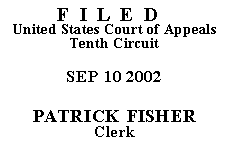

| UNITED STATES OF AMERICA, |
CR-94-262-MV) |
ORDER AND JUDGMENT(*)
Before EBEL, LUCERO, and O'BRIEN, Circuit Judges.
After examining the briefs and appellate record, this panel has determined
unanimously that oral argument would not materially assist the determination of
this appeal. See Fed. R. App. P. 34(a)(2); 10th Cir. R. 34.1(G). The case is
therefore ordered submitted without oral argument.
Petitioner, Jose Gonzalez-Gonzalez, was convicted by a federal jury of two drug-related crimes. Displeased with the sentence imposed and seeking to resurrect a previously abandoned plea agreement, he filed a petition under 28 U.S.C. § 2255 claiming he received ineffective assistance from a team of attorneys he employed to replace his first attorney. The district court denied relief and further denied his application for a certificate of appealability. Mr. Gonzalez-Gonzalez appeals, in effect renewing his request for a certificate of appealability, which we also deny.
Under 28 U.S.C. § 2253(c)(2), a petitioner must show that reasonable jurists could debate whether the district court should have resolved the issues differently or that the issues presented were "adequate to deserve encouragement to proceed further." Slack v. McDaniel, 529 U.S. 473, 484 (2000) (quoting Barefoot v. Estelle, 463 U.S. 880, 893 and n.4 (1983) (internal citations omitted)). We review the district court's legal rulings de novo, but defer to its factual findings if they are not clearly erroneous. United States v. Kennedy, 225 F.3d 1187, 1193 (10th Cir. 2000), cert. denied, 532 U.S. 943 (2001).
On a claim of ineffective assistance of counsel we require a defendant to show (1) counsel's performance fell short of the kind of adversarial advocacy required by the Sixth Amendment, and (2) the deficient performance resulted in an unfair trial and an unreliable verdict. Strickland v. Washington, 466 U.S. 668, 687 (1984). We do not indulge hindsight in evaluating counsel's effectiveness, but apply a "strong presumption that counsel's conduct falls within the wide range of reasonable professional assistance." Id. at 689.
Mr. Gonzalez-Gonzalez was charged with conspiracy to possess with intent to distribute more than 1,000 kilograms of marijuana, possession with intent to distribute same, and aiding and abetting in the possession and distribution scheme, in violation of 21 U.S.C. § 846, 21 U.S.C. § 841(a)(1) and (b)(1)(A)(vii), and 18 U.S.C. § 2. His first jury trial started December 5, 1994. After a jury was selected, and upon seeing his co-defendant enter a guilty plea and agree to testify against him, Mr. Gonzalez-Gonzalez informed the court that he also wished to plead guilty. The next day, with a plea agreement in hand, he pled guilty to the charges and received a minimum term of fifteen years imprisonment.
Mr. Gonzalez-Gonzalez then relieved his attorney and hired a new defense team, those now challenged for ineffectiveness. The new team, consisting of two partners from the same firm, filed a writ of coram nobis seeking to withdraw the guilty plea. The district court granted the writ. Thereafter, the defense team negotiated a new plea agreement calling for a minimum term of ten years incarceration. Mr. Gonzalez-Gonzalez acknowledged in writing that counsel had at all times kept him abreast of the particulars of his case, and that in the absence of the plea agreement he faced a minimum possible sentence of twenty years.
A new change-of-plea hearing was set for November 9, 1995, but was aborted because Mr. Gonzalez-Gonzalez suffered a medical emergency. No new plea hearing was set and the case went to trial before a jury on December 18, 1995. At no time during trial or at sentencing did Mr. Gonzalez-Gonzalez claim that he wanted to accept the plea agreement and plead guilty. In fact, at sentencing he claimed he was innocent of the charges. He was sentenced to the statutorily-required minimum of 240 months incarceration on each count, to run concurrently. The severity of the sentence is explained in part by a prior felony drug conviction.
The district court held a hearing on the post-conviction petition and its included claims of ineffective assistance of counsel. The evidence was sharply contradictory. Mr. Gonzalez-Gonzalez claimed he always wanted to plead guilty according to the terms of the second negotiated plea agreement, but his attorneys failed to accommodate his wishes. The attorneys claimed Mr. Gonzalez-Gonzalez insisted on going to trial contrary to their advice. At the conclusion of the § 2255 hearing, the district court found the testimony of defense counsel credible and the sum of the evidence contrary to Mr. Gonzalez-Gonzalez's position. After resolving the conflicting evidence, the court concluded that counsel's performance was not deficient.
Mr. Gonzalez-Gonzalez is no stranger to attorneys or the criminal justice system and his vacillation did yield results. Although now on his third counsel, he had confidence in his defense team early on when they convinced the court to set aside his guilty plea. His confidence continued when he signed the second detailed plea agreement which reduced the minimum term of incarceration from fifteen to ten years. Only after sentencing did his confidence in counsel seem to wane.
Mr. Gonzalez-Gonzalez seems to appreciate the benefits of retrospection. A fact-finder could reasonably conclude that his retrospection was cultivated, particularly in light of contrary evidence. Our review of the record confirms that the district court's resolution of disputed factual matters was not clearly erroneous and, crediting the court with a fair resolution of disputed facts, the performance of Mr. Gonzalez-Gonzalez's defense team was not constitutionally deficient. The other issues raised in his brief are not supported by the record and do not merit discussion.
Accordingly, we deny the request for a certificate of appealability and DISMISS the case.
Entered for the Court
TERRENCE L. O'BRIEN
Circuit Judge
*. This order and judgment is not binding precedent except under the doctrines of law of the case, res judicata and collateral estoppel. The court generally disfavors the citation of orders and judgments; nevertheless, an order and judgment may be cited under the terms and conditions of 10th Cir. R. 36.3.